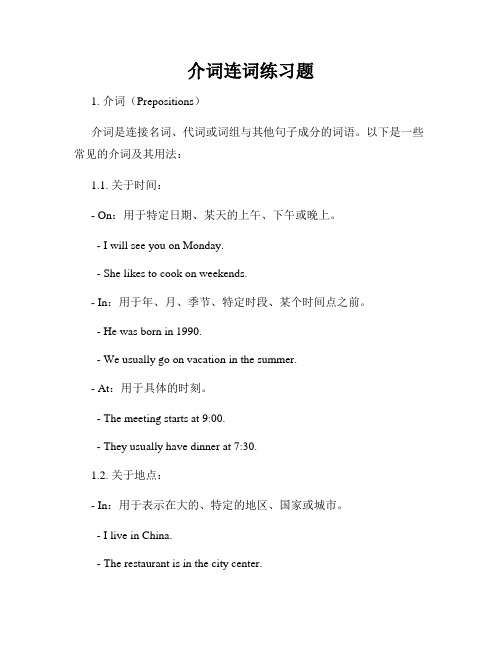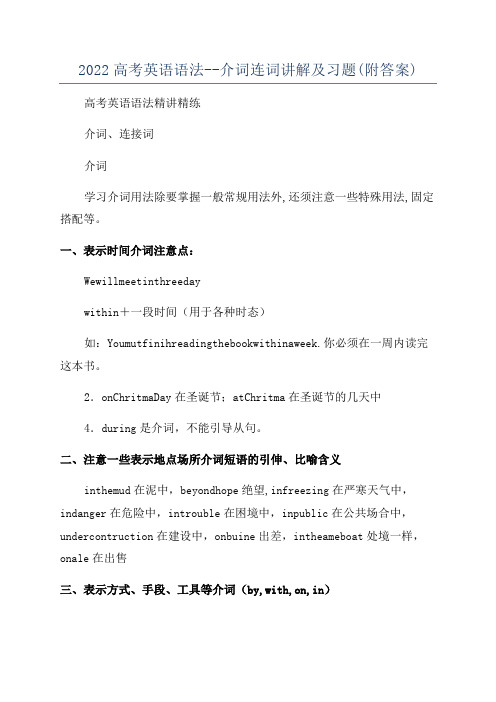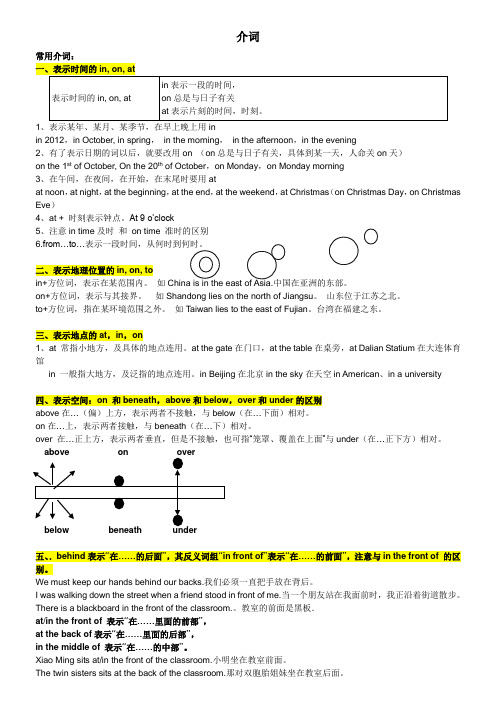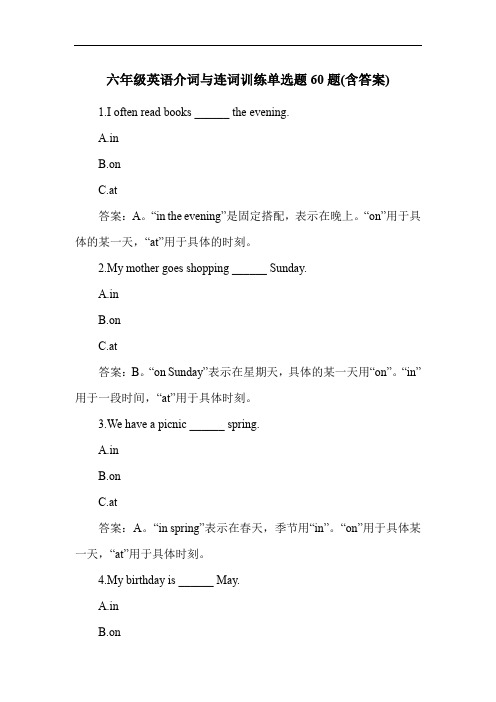介词和连词的用法及专项练习
介词连词练习题

介词连词练习题1. 介词(Prepositions)介词是连接名词、代词或词组与其他句子成分的词语。
以下是一些常见的介词及其用法:1.1. 关于时间:- On:用于特定日期、某天的上午、下午或晚上。
- I will see you on Monday.- She likes to cook on weekends.- In:用于年、月、季节、特定时段、某个时间点之前。
- He was born in 1990.- We usually go on vacation in the summer.- At:用于具体的时刻。
- The meeting starts at 9:00.- They usually have dinner at 7:30.1.2. 关于地点:- In:用于表示在大的、特定的地区、国家或城市。
- I live in China.- The restaurant is in the city center.- On:用于表示在街道、大街、公路等具体地点。
- The post office is on Main Street.- The accident happened on the highway.- At:用于表示在具体的建筑、地址或地方。
- She is waiting for you at the cinema.- They will meet at the coffee shop.1.3. 关于方式:- By:用于表示通过某种交通工具、方式或手段。
- I usually go to work by bus.- We communicate by email.- With:用于表示携带某物或与某人一起。
- He always goes to the gym with his friends.- She wrote the letter with a pen.2. 连词(Conjunctions)连词是连接两个词、短语、从句或句子的词语。
2022高考英语语法--介词连词讲解及习题(附答案)

2022高考英语语法--介词连词讲解及习题(附答案)高考英语语法精讲精练介词、连接词介词学习介词用法除要掌握一般常规用法外,还须注意一些特殊用法,固定搭配等。
一、表示时间介词注意点:Wewillmeetinthreedaywithin+一段时间(用于各种时态)如:Youmutfinihreadingthebookwithinaweek.你必须在一周内读完这本书。
2.onChritmaDay在圣诞节;atChritma在圣诞节的几天中4.during是介词,不能引导从句。
二、注意一些表示地点场所介词短语的引伸、比喻含义inthemud在泥中,beyondhope绝望,infreezing在严寒天气中,indanger在危险中,introuble在困境中,inpublic在公共场合中,undercontruction在建设中,onbuine出差,intheameboat处境一样,onale在出售三、表示方式、手段、工具等介词(by,with,on,in)1.by:Theblindmenthoughttheycouldlearnwhattheelephantlookedli kebytouchingit./makealivingbyteaching/byhand手工地,靠手工地,byletter,bypot,byelectricity,learnth.byheart,truckbythebeauty因美丽而着迷Hewapaidbythehour/theday/month/…他按时/日/月/…被付给工钱。
byplane/train/hip/air/water/ea/…,bymeanof用…手段,方式;bywayof经由,取道于…learnEnglihby/over/throug h/ontheradio2.on:liveonfood,kneelonone¢knee,lie/leeponone¢back/ide/face 仰/侧/俯卧(睡)3.in:inEnglih,inink,inilence,inonevoice异口同声地,inahurry 匆忙地,inurprie惊讶地4.with:writewithapen,workwithone¢hand,mellwithone¢noe,beatt hehorewithawhip(鞭子)四、相近介词(短语)辨析about“关于”,知识性或随便谈论:adicuionabouttheplan3.over在…正上方,under在…正下方above在…上面(不一定垂直上方),below在…下面4.inanhour一小时后,用于将来时afteranhour一小时后,用于过去时5.beide在…旁边beide除…之外(还有)e某cept除…之外e某ceptfor除(非同类事物)之外6.on/inthetreetat50DongfengRoad在东风路50号高考英语语法精讲精练7.aholeinthewallapictureonthewallapieceofnewinthenewpaperthewordintheenvelopthemonkeyinthetreetheappleonthetree(树上的苹果。
中考重点介词与连词的用法

中考重点介词与连词的用法一、介词的用法介词是连接名词、代词、动词或其他词类与句子其他成分之间关系的一类虚词。
下面是一些中考常见的介词及其用法。
1. in表示在某个时间、地点或范围内。
- My birthday is in July.(我的生日在七月。
)- He lives in Beijing.(他住在北京。
)- There are many flowers in the garden.(花园里有很多花。
)2. on表示在某个具体的日期或日子上以及在某个表面上。
- I was born on October 1st.(我出生在十月一日。
)- There is a book on the table.(桌子上有一本书。
)3. at表示在某个时间、地点或某种情况下。
- We have dinner at 7 p.m.(我们在晚上七点吃晚饭。
)- I met him at the park.(我在公园遇到了他。
)4. by表示通过某种方式或方法。
- I usually go to school by bus.(我通常乘公交车去学校。
)- He sent the letter by mail.(他通过邮寄发送了这封信。
)5. for表示某个时间段、目的或原因。
- He has been waiting for two hours.(他已经等了两个小时。
)- I bought this gift for my sister.(我为我姐姐买了这个礼物。
)二、连词的用法连词主要用于连接词与词、短语与短语、句子与句子等。
以下是一些中考常见的连词及其用法。
1. and表示并列关系,连接同类词、短语或句子。
- I like apples and oranges.(我喜欢苹果和橙子。
)- He is tall and handsome.(他又高又帅。
)2. but表示转折或对比关系,连接两个相对的内容。
- She is poor but happy.(她虽然穷,但很快乐。
介词与连词讲解与练习(答案)

介词常用介词:1、表示某年、某月、某季节,在早上晚上用inin 2012,in October, in spring,in the morning,in the afternoon,in the evening2、有了表示日期的词以后,就要改用on (on总是与日子有关,具体到某一天,人命关on天)on the 1st of October, On the 20th of October,on Monday,on Monday morning3、在午间,在夜间,在开始,在末尾时要用atat noon,at night,at the beginning,at the end,at the weekend,at Christmas(on Christmas Day,on Christmas Eve)4、at + 时刻表示钟点。
At 9 o’clock5、注意in time及时和on time 准时的区别6.from…to…二、表示地理位置的in, on, toin+方位词,表示在某范围内。
如on+方位词,表示与其接界。
如Shandong lies on the north of Jiangsu。
山东位于江苏之北。
to+方位词,指在某环境范围之外。
如Taiwan lies to the east of Fujian。
台湾在福建之东。
三、表示地点的at,in,on1、at 常指小地方,及具体的地点连用。
at the gate在门口,at the table在桌旁,at Dalian Statium在大连体育馆in 一般指大地方,及泛指的地点连用。
in Beijing在北京in the sky在天空in American、in a university四、表示空间:on 和beneath,above和below,over和under的区别above在…(偏)上方,表示两者不接触,与below(在…下面)相对。
六年级英语介词与连词训练单选题60题(含答案)

六年级英语介词与连词训练单选题60题(含答案)1.I often read books ______ the evening.A.inB.onC.at答案:A。
“in the evening”是固定搭配,表示在晚上。
“on”用于具体的某一天,“at”用于具体的时刻。
2.My mother goes shopping ______ Sunday.A.inB.onC.at答案:B。
“on Sunday”表示在星期天,具体的某一天用“on”。
“in”用于一段时间,“at”用于具体时刻。
3.We have a picnic ______ spring.A.inB.onC.at答案:A。
“in spring”表示在春天,季节用“in”。
“on”用于具体某一天,“at”用于具体时刻。
4.My birthday is ______ May.A.inB.on答案:A。
“in May”表示在五月,月份用“in”。
“on”用于具体某一天,“at”用于具体时刻。
5.I get up ______ six o'clock in the morning.A.inB.onC.at答案:C。
“at six o'clock”表示在六点钟,具体时刻用“at”。
“in”用于一段时间,“on”用于具体某一天。
6.They go to school ______ Monday to Friday.A.fromB.onC.at答案:A。
“from Monday to Friday”表示从周一到周五。
“on”用于具体某一天,“at”用于具体时刻。
7.My father comes back home ______ night.A.inB.onC.at答案:C。
“at night”是固定搭配,表示在晚上。
“in”用于一段时间,“on”用于具体某一天。
8.We have an English class ______ Wednesday afternoon.B.onC.at答案:B。
六年级英语介词与连词训练练习题30题含答案解析

六年级英语介词与连词训练练习题30题含答案解析1.I usually go to school ______ seven o'clock in the morning.A.atB.onC.in答案解析:A。
at 用于具体的时刻前;on 用于具体的某一天;in 用于年、月、季节以及泛指的上午、下午、晚上等。
这里是具体的时刻七点,所以用at。
2.My birthday is ______ May.A.atB.onC.in答案解析:C。
in 用于年、月、季节等;on 用于具体的某一天;at 用于具体的时刻前。
这里是月份五月,所以用in。
3.We often have a picnic ______ Sunday afternoon.A.atB.onC.in答案解析:B。
on 用于具体的某一天的上午、下午、晚上;in 用于年、月、季节以及泛指的上午、下午、晚上等;at 用于具体的时刻前。
这里是具体的周日下午,所以用on。
4.My father gets up early ______ the morning.A.atB.onC.in答案解析:C。
in the morning 是固定搭配,表示在早上。
at 用于具体的时刻前;on 用于具体的某一天。
5.She goes to bed late ______ night.A.atB.onC.in答案解析:A。
at night 是固定搭配,表示在晚上。
in 用于年、月、季节以及泛指的上午、下午、晚上等;on 用于具体的某一天。
6.The meeting will start ______ ten minutes.A.inB.afterC.on答案解析:A。
in 加一段时间表示在一段时间之后;after 后面一般跟具体的时间点或时间段;on 用于具体的某一天。
这里是十分钟之后,所以用in。
7.He finished his homework ______ an hour.A.inB.afterC.on答案解析:A。
初中语法专项练习——介词和连词(含答案)
初中英语语法专项练习八——介词一.选择填空:1.Mrs. Brown came to China ____ 1996.A.from B.of C.to D.in2.The room was full ____ smoke after the big fire.A.of B.with C.in D.for3.Here are some presents ____ you ____ our best wishes.A.to; with B.for; with C.of; about D.for; for4.Both Mr Green and Mrs Green were born ____ June, 1956.A.in B.at C.on D.for5.The little boy is always interested ____ science.A.with B.by C.in D.at6.Li Lei often gets up ____ seven o'clock on Sundays.A.on B.in C.at D.for7.They arrived early ____ a Tuesday morning.A.on B.at C.in D.of8.Macao(澳门)will return to our motherland ____ December 20th, 1999.A.on B.at C.in D.for9.----When were you born? ----I was born ____ August 25, 1983.A.on B.in C.at D.to10.Let me show you the place ____ the map.A.with B.on C.in11.John knows ____ a computer.A.how to use B.how use C.how uses12.The visitors ____ Japan arrived ____ Beijing Station last Tuesday morning. A.from; at B.of; to C.from; to D.of; on13.The teacher will be back ____ an hour.A.in B.after C.on14.This programme was sent to the USA ____ China ____ satellite.A.in; of B.of; in C.from; by D.by; from15.It's cold outside. Please your warm clothes.A. put inB. take offC. put onD. put up16.He got many gifts his birthday his friends.A. on, fromB. in, ofC. at, toD. from, for17.The classroom is quite different that one.A. ofB. fromC. withD. like18.Look, you'll see a bridge the river.A. onB. aboveC. overD. in19.–Your coat looks nice, Is It cotton? -Yes. It's Shanghai.A. made of, made byB. made of, made inC. made for, made inD. made from made by20.Tow may fall the others because he has missed so many lessons.A. afterB. behindC. laterD. out of二、用适当的介词填空1.What's wrong ____ your watch?2.One ____ the students is in the classroom.3.I think the shop is closed ____ this time of day.4.My father teaches English ____ a school.5.We have lunch ____ the middle of the day.6.You can buy some school things ____ your way home.7.I was born ____ July 1, 1982.8.May I borrow a pencil ____ you?9.Don't sleep ____ the open air.10.I often help my mother ____ _ the housework.11.It's time ____ school.12.I have quite a lot ____ homework to do.13.What's the time? It's half ____ seven.14.Ducks are good ____ swimming.15.What are you talking ____ ?16.He is sitting ____ the front of the car.17.The eraser was passed ____ one student ____ another. 18.Did you live ____ Beijing in 1997?19.When did you arrive ____ the village?20.I think Mary is ____ duty today.21.Eating too much isn't good ____ your health.22.I'm afraid he is ____ the cinema ____ the moment. 23.Thanks ____ asking me to your party.24.My watch is very different ____ yours.25.What's the weather ____ today?26.The student is asking his teacher ____ the sports meeting. 27.The farmers are all getting ready ____ the next year. 28.The radio says the wind will stop later ____ the day. 29.Let's go out ____ a walk, shall we?30.Tom, your mother is waiting ____ you.31.We have noodles for lunch for lunch ____ times. 32.Harerbin is ____ the north of China.33.The day ____ tomorrow will be windy.34.Don't worry ____ your test.35.I don't know which is the way ____ the park.36.An old woman is ____ the side of the road.37.____ the end of the road you'll see the hospital38.He left Tokyo ____ a visit ____ Beijing.39.Don't laugh ____ other people's mistakes.40.He did this instead ____ me.41.The people here are very friendly ____ us.42.Does he learn English ____ himself?43.I felt a little afraid ____ my teacher.44.I'm afraid he'll fall ____ the bike.45.Help yourselves ____ some fish, Lily and Lucy.46.____ these words he left the classroom.47.It was a pleasure ____ me.48.I'm sorry I'm late ____ the meeting.49.Study hard, or you won't catch up ____ your classmates. 50.Not far ____ him was Lin Tao.Lin Tao ran fast, too. 51.Mr Wu is going to tell us the result ____ once.52.He goes to school early ____ usual.53.It's another way ____ saying fast.54.I'm sorry he doesn't agree ____ me.55.He prefers playing football ____ playing basketball.56.What do you mean ____ baozhi?57.Don't play ____ fire.It's dangerous.58.He didn't go ____ bed until twelve o'clock.59.My teacher was angry ____ me.60.Someone is knocking ____ the door.61.Have you heard ____ Jim yet?62.If you break the window, you'll have to pay ____ it.63.I'm sorry.I won't talk to others in class ____ now on.64.What have you done ____ the milk?65.The students walked ____ the gates with Uncle Wang.66.Are you ____ trouble, Jim?67.My mother is ill.I have to send ____ the doctor.68.The doctor operated ____ my mother at once.69.The glass is full ____ milk.70.I saw him ____ the crowd.71.There are a group of sheep ____ the foot of the hill.72.We are twins.People often mistake us ____ each other.73.The knife is made ____ metal and wood.74.Ships can travel ____ the world.75.He watched me ____ surprise.76.Choose my subject.Something about English, ____ example.77.Tie the horse ____ the tree.78.Nothing can stop us ____ studying hard.79.____ Mr Wang's help, I have passed the exam.80.Please cut the metal ____ some pieces.81.I feel ____ going for a walk.82.We can finish the work ____ a week.83.Are you interested ____ the film Titanic?84.Hundreds ____ years ago, there was a village here.85.What ____ earth can you see?86.When did you join us ____ the game?参考答案:一、1.D.在年代前面用介同in2.A.full of是一个短语,意为“充满……”3.B.给“谁”的礼物,用介词for,with表示“带(着)”4.A.在年、月名称前用介词in,而在日期前则用on5.C.be/get/become interested in 对……感兴趣6.C.在“几点钟”,用at7.A.在“早、午、晚”前面,用介词in,但在具体某一天的“早、午、晚”前则用on 8.A.9.A.在日期前用介词on10.B.注意:on the map,on the paper,in the newspaper,in the book,这些短语中用不同的介词11.A.teach,tell,ask,learn等动词后可接“疑问词+to不定式”结构作宾语12.A.第一空填from表示“来自”;第二空填at是因为后面的名词中心词是station 13.A.in后面接表示一段时间的短语,用在一般将来时态中,表示“多长时间以后”14.C.from表示“从……”,by satellite通过卫星15.从句意理解,意为穿上暖和的衣服,应选 C16.具体某一天用介词 on,从朋友处得到礼物用from,故应选A17.be different from为固定搭配,应选B18.on表示河面上,above表示河上方,in表示河里,而over表示桥跨两岸,故应选C 19.衣服看出原料用 be made of,在哪里制造用be made in,故应选B20.意为他可能落后于其他人,落后为 fall behind,应选B1.with.What’s wrong with sb./sth.?某人/某物怎么啦?2.of.one of………之一此句的主语是one,of短语作定语3.at.at this time of day 在一天当中的这个时候4.at.at a(the)school在学校;at school在校读书5.in.in the middle of 在……(时间、地点的)中间6.on.on one's way(home)在某人(回家)的路上,way后面常接“to+名词短语”,表示……在去……的路上,因此句中的home是副词,故其前不加to7.on8.from.borrow…from从(某人或某处)借(入)某物比较 lend sth.to sb.把某物借(出)给某人9.in.in the open air“在野外/露天”,也可说成 in the open10.with.help sb.with.sth.帮助某人做某事11.for.注意 time的两种句型:It’s time for…(名词) It’stime to do sth.两个短语的意思都是:“该做某事了”或“做某事的时间到了”12.of.a lot of “许多”该短语既可修饰可数名词,也可修饰不可数名词此短语也可说成 lost of(多用于书面语)13.past.past意为“过……(多少时间)”14.at.be good at擅长……15.about.talk about 谈论,talk to 和……交谈16.in.in the front of……(物体内部)的前面比较 in front of 在……(物体外部)的前面17.from;to.from one to another从一个到另一个18.in.在较大的地名前用介词in19.at.到达小地方用介词at20.on.on duty值班、值日21.for,be good/bad for表示客观事物对某人如何,所以其它主语多为something或动名词be good/kind/friendly/bad to 多指某人对某人如何,其主语多为somebody 22.at; at.at the cinema 在电影院,at the moment 此刻、现在23.for.Thanks(Thank you)for(doing)sth.谢谢你(做某事)24.from.different from…与…不同25.like.like意为“象……”26.to.ask sb.to sth.邀请某人参加某项活动27.for.get ready for为……准备28.in.in the day在白天,也中说成 in the daytime29.for.go out for a walk出去散步30.for.wait for等待31.at.at times有时,间或32.in.in the north of 在……(内部的)北部33.after.the day after tomorrow后天34.about.worry about为……担心35.to.50.at 51.Atat the end在……的末端,末尾36.for;to.for a visit中的for表目的;a visit to…表“参观37.at.laugh at嘲笑38.of.instead of代替39.to.56.by oneself由自己40.of.feel afraid of感到害怕……,be afraid of害怕……41.off.fall off从……上摔下来42.to.help oneself to sth.随便吃/用/拿某物43.With.With these words说完这些话44.for.表示“(客观上)对……来说”45.for.be late for(做某事)迟到了46.with.catch up with 赶上47.behind.表示Lin Tao在he的后面此处用behind强调前后位置far后面还可接介词from,表示“远离”48.at.at once立即49.as.as usual象往常一样50.of.way of doing sth.做某事的方法way后面还可接to不定式做定语51.with.agree with同意某人的看法52.to.prefer(doing)sth.to(doing)sth.喜欢……胜过喜欢53.by.What do you mean by…?你(那么)说是什么意思?54.with.play with 玩弄……55.to56.with.be angry with 生某人的气57.at.knock at(on)敲58.from.hear from收到某人的来信59.for.pay for付……的钱此处作“赔偿”讲60.from.from now on从今往后61.with.do with处理、对付62.through63.in.in trouble陷入困境64.for.send for派人去请65.on.operate on给……做手术66.of67.among.among the crowd在人群中68.at.at the foot of在……脚下69.for.mistake…for…把……错当成……70.of.be made of由……制成(看得见原材料)比较 be madefrom 由……制成(看不见原材料)71.around.around the world全世界72.in.in.surprise惊奇地73.for.for example“例如”可置于句首、句中或句尾,只举出一个例子74.to.tie…to…把……绑在……上75.from.stop sb.from doing sth.阻止某人做某事76.With.with one’s help在……的帮助下77.into.cut…into pieces把……切成碎片78.like.feel like(doing)sth.想要(做)某物(事)79.in.in前面用can之类的情态动词,in表示“在……(多长时间)之内”;in与一般将来时连用,表示“在……(多长时间)之后”80.in81.of.hundreds of数以百计的82.on.此处意为“到底、究竟”,用在疑问词后on earth还可指“在世界上、在人世间”83.in.join sb.in sth.参加某人的活动初中英语语法专项练习九——连词1. He can speak English_______ Chinese.A. butB. alsoC. soD. and2. Physics is not so easy, _______I like it very much.A. butB. orC. sinceD. because3. Will Tom wait for her at home ______ at the library?A. orB. asC. so thatD. both4. She has a son _______ a daughter.A. butB. andC. soD. or5. I'll give her the gift ______ she arrives.A. soB. beforeC. as soon asD. since6. Tom was ____ill that we had to send for a doctor.A. soB. veryC. andD. too7. The woman was____ angry_____ she couldn't speak anything.A. neither…norB. either…orC. both…andD. so…that8. ______we got home it was very late.A. WhenB. WhileC. BecauseD. As9. We heard clearly_____ she said.A. whatB. whichC. beforeD. because10. I can't sleep well at night, ______I often feel very tired in the day.A. soB. becauseC. andD. or11. When you're learning a foreign language, use it, ______ you will lose it.A. butB. orC. thenD. and12. --- Can you play football?--- Yes, I can, ______ I can't play it very well.A. orB. andC. butD. so13. Study hard, ______ you will fall behind.A. andB. butC. soD. or14. My favorite is action movie ______ I think it's exciting.A. andB. becauseC. butD. so15. The boy is very smart, ______ many of his classmates like him.A. butB. soC. orD. for16. He has never heard______ seen such a thing before.A. norB. andC. orD. since17. _________ John _______I are policemen.A. Neither ... norB. Either ... orC. Both ... andD. Not only... but also18. Mr Smith teaches ______well ______ his lessons are not easily forgotten.A. very ... thatB. quite ... butC. so ... asD. so ... that19. He didn't go to sleep ______he finished his homework.A. tillB. beforeC. afterD. until20. I didn't buy the dictionary yesterday ________ my aunt would give me one.A. untilB. becauseC. ifD. before21. The runner fell _______ he quickly got up and went on running.A. orB. andC. butD. down22. Wait for me in the room _______ I come back.A. untilB. andC. soD. or23. I'll return the books to the library ______ soon as possible.A. asB. soC. justD. but24. Go along the road, _______ you'll find the market at the end of it.A. whenB. andC. orD. though25. You'll be late ______ you don't get up early tomorrow morning.A. ifB. whenC. beforeD. until26. It was late. She washed her face ______ went to bed.A. orB. andC. soD. but答案:1-5 DAABC 6-10 ADAAA 11—15 BCDBB16-20 CADDB21-26 CAABAB。
高考英语语法介词和并列连词
高考总复习 ·英语
返回导航
语法专项提升 专题四
1.介词搭配 介词的主要考查方式之一就是与动词、名词等搭配成短语,常用搭配形式如下: (1)介词+名词:in turn轮流;in danger在危险中;out of order出故障;by no means决不 (2)名词+介词:reason for……的原因;effect/influence on对……的影响 (3)形容词+介词:angry with生(某人)气;concerned about关心 (4)动词+介词:laugh at嘲笑;agree on对……达成协议 (5)动词+副词+介词:go in for爱好,从事;put up with忍受 (6)动词+名词+介词:take advantage of利用;pay attention to注意 (7)动词+sb/sth+介词:prevent sb from阻止某人做……;remind sb of提醒某 人……
一般指在物体的表面,或相邻并接壤的
on 两个地域
Vietnam is on the south of China.
to
表示某范围外不接壤的两个位置 Jiangsu Province is to the southeast
of Hebei Province.
高考总复习 ·英语
返回导航
语法专项提升 专题四
so
expecting me.
对比
while(意为“然而,而”)
He likes pop music, while I am fond of folk music.
高考总复习 ·英语
返回导航
介词
用法
示例
across 从……的表面穿过 He walked across the square to meet us.
高考英语语法填空介词、代词、连词、冠词和情态动词知识点汇总
④表示“关于”、“对于”cry over the silt milk
⑤表示“一面……,一面……”talk over a cup of tea
⑥表示“以上”、“超过”over and above, cost over £5
②表示“和”、“与”quarrel/argue with, go with, have nothing to do with
③表示“用”cut it with a knife, have no pen with which to write
④表示伴随状态walk with a stick, with no hat on
④表示理由、原因“因为”for fear of
⑤表示“代替,代表”substitute...for..., speak for
⑥表示“交换”(暗含一定的比例关系)translate word for word
⑦表示时间上、距离上,数量上的“历经……、多达……”for hours, last (for) one hour, run (for) a mile
⑦表示“关注”、“关照”look after, ask after you
above含义为“在……之上”,引申为“难于”、“所不及”、“超过”之意50 feet above sea level, above comprehension
under①表示“在……下”、“在……内部”、“在……脚下”under a tree, under a hill
分析:因these proverbs是名词,且不是作主,宾,表,前面很有可能填介词;句意是“在中国这些成语故事背后常常有有趣的故事”,表示“在......背后”,用介词behind。
初中英语介词技巧(很有用)及练习题及解析
初中英语介词技巧(很有用)及练习题及解析一、初中英语介词1.—Excuse me, is there a computer room in your school?—Yes. It's ________ the fifth floor.A. onB. inC. atD. to【答案】A【解析】【分析】句意:——打扰了,你们学校有一个电脑室吗?——是的,在五楼。
on 在......上,in在......里,at指向,to指向。
表示在第几楼使用介词on。
故选A。
【点评】考查常用介词的用法。
2.—Is there ________ in today's morning news on CCTV-1?—Yes, France Team beat Korea Team by 4: 0 in the 8`h FIFA Women's World Cup in France ________ June 8, 2019.A. anything special; onB. something special; inC. special something; onD. anything special; in【答案】 A【解析】【分析】句意:——在央视一今日新闻里有特殊的事情吗?——是的。
法国队在2019年6月8日的法国第八届女子足球世界杯中以4:比0的成绩击败了韩国队。
复合不定代词+形容词,排除B、C。
问句是一般疑问句,所以用anything;on+几月几日,June 8 是几月几日,具体日期,所以用on,故选A。
【点评】考查复合不定代词及介词用法,注意平时识记,理解句意。
3.—Excuse me. Where is the nearest bookstore?—Go ________ Center Street and you'll find it.A. ForB. alongC. with【答案】 B【解析】【分析】句意:——打扰一下。
- 1、下载文档前请自行甄别文档内容的完整性,平台不提供额外的编辑、内容补充、找答案等附加服务。
- 2、"仅部分预览"的文档,不可在线预览部分如存在完整性等问题,可反馈申请退款(可完整预览的文档不适用该条件!)。
- 3、如文档侵犯您的权益,请联系客服反馈,我们会尽快为您处理(人工客服工作时间:9:00-18:30)。
介词和连词的用法(一)表示时间的介词1.英语里最常见的时间介词有:at, in, on, before, after和from。
2.at , in和on这三个词都表示时间。
✧at主要指具体的钟点:at half past eight 在八点半✧in一般指某一段时间:in January 在一月份✧on指具体在某一天:on Monday 在星期一3.before和after表示时间的先后顺序。
✧before表示“在……之前”。
You should wash your hands before eating. 吃饭前你应该洗手。
✧after表示“在……之后”。
They often play basketball after dinner. 他们放学后经常打篮球。
4.from作时间介词含有“从……开始”的意思,常和to连用,组成“from…to…”的结构,表示“从……到……”的意思。
We go to school from Monday to Friday. 我们从周一到周五上学。
(二)表示方位的介词,也就是表示位置和地点的介词。
1.小学阶段常见的方位介词有:on, in, at, under, over, above, below, about, around,between等。
2.on, over和above这三个词都有“在……上面”的意思,但它们所表示的方位还是有些不同。
✧on表示两个物体的表面相互接触。
如:There is a book on the desk. 桌上有一本书。
The boy is sleeping on the desk. 那个孩子睡在地上。
✧over表示“在……的正上方”,两个物体表面没有接触。
如:There is a light bulb over my head. 在我头顶上有一个灯泡。
✧above表示两个物体中一个在另一个的上方,如:The plane is flying above the clouds. 飞机上云层上飞行。
There are four lights above our head. 在我们头上有四盏灯。
3.under和below都有“在……的下面”的意思,但它们有区别:✧under表示“在……的正下方”,其反义词是over。
There is a ball under the chair. 椅子下面有一个球。
They are sitting under a big tree. 他们正坐在一棵大树下面。
✧below表示“在……”的下面,不强调是否在正下方。
Their house is below mine. 他们家的房子在我家的下面。
4.in表示位置“在……里面”,也可以用来表示在一个很大的空间内。
The children are playing in the room. 孩子们正在房间里玩。
All my books are in my bag. 我所有的书都在我的书包里。
5.around表示“在……周围”。
There are lots of flowers around the house. 房子周围有许多花。
The children sat around the Christmas tree and sang happily.孩子们围坐在圣诞树旁边高兴地唱歌。
6.behind表示“在……的后面”。
Don’t hide yourself behind a tree. 别躲在树后。
7.in front of表示“在……的前面”。
There are some trees in front of the house. 房子前面有一些树。
8.between表示“在两者之间”。
My home is between the two mountains. 我家在两座大山之间。
Guang Jie sits between Li Lei and Fang Ning. 冠杰坐在李磊和芳宁之间。
(三)表示方式的介词9.常见的表示方式的介词有:by, with, in等。
10.by表示“靠……”,“用……”。
11.with表示“使用……”,“和……一起”,“有……”,“具有……”“带有……”。
12.in表示“用……(语言)”。
My father goes to work by car. 我父亲开车上班。
I can see with eyes. 我能用眼睛看。
I can speak in English. 我会用英语讲。
连词and意思是“和”,表示并列和对称。
I can speak English and Chinese. 我会讲英语和中文。
I like apples, bananas and grapes. 我喜欢苹果、香蕉和葡萄1.or意思是“或者”,“还是”,表示选择。
Is your friend is a boy or a girl? 你的朋友是男孩还是女孩?Do you learn English or French? 你学英语还是法语?注意:(误)I don’t like coffee and te a.(正)I don’t like coffee or te a. 我不喜欢喝咖啡和茶。
(正)I like coffee and tea. 我喜欢喝咖啡和茶。
2.but意思是“但是”,表示转折。
I have a cold, but I don’t take medicine. 我感冒了,但我没吃药。
The skirt is nice, but it’s too expensive. 这条裙子很漂亮,但太贵了。
3.so意思是“因此”,“所以”。
It’s dark, so I must go now. 天黑了,所以我得走了。
You got up too late, so you missed the bus. 你起床晚了,所以错过了公共汽车。
一、选择填空。
( ) 1. The Greens were watching TV _____ I came in. A. before B. after C. when ( ) 2. Jack was sad ____ he failed his math exam again. A. so B. because C. but ( ) 3. The bus arrived _____7:30 a. m. A. on B. at C. in( ) 4. Your mouth is _____ your nose. A. under B. below C. near( ) 5. We don’t go to school _____Saturday and Sunday. A. on B. in C. at ( ) 6. Did you go to the zoo _____ foot? A. by B. on C. in( ) 7. I write _____my hand. A. in B. with C. by( ) 8. Can you sing this song ______English?A. inB. withC. on( ) 9. He learns English _____ TV.A. inB. onC. with( ) 10. Tony comes _____ Australia.A. fromB. toC. in( ) 11. Everyone is sitting ___ the floor, but Mr Brown is sitting ____ a chair _____ the corner.A. over, in, onB. about, on, atC. on, on, in( ) 12. During the weekdays, Jim gets up early ____ the morning and goes to bed late ____ night .But _____ weekends he sleeps until midday.A. on, at, atB. in, at, onC. in, in, at( ) 13. The mother is coming back ____ an hour.A. afterB. forC. in( ) 14. Don’t worry, Tom will return______.A. before longB. long beforeC. long ago( ) 15. Paper is often made ____ wood.A. byB. inC. of二.介词填空1.Tony is ________ Canada.2.What is the name ________ the factory?3.Betty is English. What ________ you?4.Where do you come ________?5.Do the students stay ________ home ________ Saturday?6.The meeting ended ________ 6 p.m.7.We’ll play football ________ cl ass.8.—where are you from?9.—I am ________ Beijing.10.Let’s count the numbers ________ one ________ fifty.11.—Where shall we meet?12.—We’ll meet ________ home.13.He is good ________ swimming.14.Tom gets ________ at seven every morning.15.________ Sunday morning, he played football with his friends.16.What’s wrong ________ you?17.It’s time ________ breakfast.18.Can you sing a song ________ English?19.Please listen ________ me carefully.20.Don’t be late ________ this meeting.三.用and, or, but填空。
1. I’d like to go with you, _____ I’m too busy.2. I don’t like apple juice _____ orange juice.3. I can speak English _____ French.4. Are you a teacher ______ a doctor?5. There is no milk ______ no fruit juice.(注:文档可能无法思考全面,请浏览后下载,供参考。
